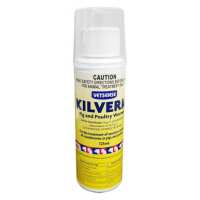
Why use Kilverm Poultry Wormer 125ml
Kill and control parasites such as worms, roundworms and thread worms are common in poultry.
Untreated parasites can cause illness and death in chickens.
This bottle contains approximately 25 doses
Effective against threadworm, hairworm (Capillaria spp.), large roundworm (Ascaridia galli) and caecal worm (Heterakis gallinae).
Suitable for use with domestic fowl, including turkeys and other birds.
Can be used with laying hens and also meat birds.
Kilverm is also suitable to treat pigs for roundworm, stomach worm, lung worm, nodule worm and mature kidney worm.
Administer dosage through drinking water for ease of use.
Country of Manufacture: Australia by Vetsense, national leaders in quality assured animal care products.
This product may only be purchased for delivery within Australia - International orders will be refunded
Symptoms of worms in chickens
A healthy chicken can handle a small number of parasites, such as worms and mites, before they begin to show symptoms of ill health. However, just like a person, a chicken will become unwell if it has a particularly high load of parasites, is stressed or has poor nutrition. Left untreated, a worm infestation can cause illness, and even death, amongst your chickens. So how do you know if your chickens are suffering from worms?
There are several types of worms that can affect poultry health and most chickens carry at least one or two of these varieties. The most common worms are intestinal worms, such as roundworms, hairworms (or threadworms) and caecal worms. Gapeworms are more uncommon and live in the throat.
When to use a poultry wormer - Symptoms of a worm infestation in chickens include:
Abnormal weight loss or weight gain, including poor weight gain in pullets and meat birds.
Higher or lower feed consumption than is usual or normal.
Pale yolk colour and/or visible “threads” in the egg-white (these are actually long, thin hairworms).
A pale wattle and comb.
Abnormal droppings. This may include diarrhea, pale coloured droppings or foamy droppings. In severe infestations, roundworms may be visible in droppings.
Dirty vent feathers.
Decreased egg production.
In the case of gapeworm, symptoms are quite different to those associated with intestinal worms and can include coughing, gaping (stretching the neck and shaking the head), gasping for breath and wheezing. Gapeworm requires special treatment and can be easily confused with Chicken Respiratory Disease.
The best cure for parasites in chickens is prevention. That is why we recommend worming your birds every 6 to 8 months, even if they are not displaying symptoms of a worm infestation. Preventative worming is particularly important if your chickens are likely to be exposed to worms or if they free range.
Don’t wait for your chickens to fall ill; worm them regularly with Vetsense Kilverm Pig and Poultry Wormer. This easy-use liquid dewormer treats the three most common forms of intestinal worms and is suitable for use with laying hens.
How to worm your chickens with Kilverm Poultry Wormer
Kilverm Pig and Poultry Wormer is for both preventative and therapeutic use with laying hens, ornamental fowl and also meat birds.
Administer the Kilverm worm treatment through drinking water. This is most effective when consumed within a short time period. We therefore recommend that you withhold water for 2 hours before nightfall and prepare the Kilvern/water mixture at daybreak. Replace with fresh water when consumed, or after 8 hours, whichever is first.
The dosage of Kilverm for poultry is 10 ml per 6 kg of bird body weight; dilute in fresh water at a rate of 1:20 (10 ml of medication to 200 ml water).
All medications, including dewormers, should be used with caution. Never treat birds during extremely hot weather, and avoid treating birds that are under stress, ill or are brooding.
For the best health, you should worm your poultry regularly, ideally in spring and autumn. Kilverm should be administered and the cage or run well-cleaned 24 hours after treatment to avoid reinfection from eggs or larvae in the immediate environment. Treatment should be repeated two weeks after the initial administration.
Kilverm is suitable for use as a wormer in both laying hens and meat birds. Do not use Kilverm within 7 days of slaughter for human consumption. Eggs from chickens treated with Kilverm have not shown any residues and are safe for consumption.
Always read instructions carefully before use. As with any medication, Kilverm Pig and Poultry Wormer can be damaging to your health if not used according to directions. Avoid contact with skin and eyes. If ingested, contact a doctor or poisons information centre immediately.
For more information on Chicken Health, visit our Chook School.
Phone:
0432143005
Email:
murray@finlaysondigital.com
Location:
16 Camuglia street,
Garbutt
Queensland
4814

